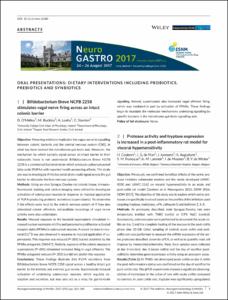KUMEL Repository
1. Journal Papers (연구논문)
1. School of Medicine (의과대학)
Dept. of Internal Medicine (내과학)
Self- reported food intolerance in Korean patients with Irritable Bowel Syndrome (IBS)
- Keimyung Author(s)
- Park, Kyung Sik
- Department
- Dept. of Internal Medicine (내과학)
- Journal Title
- Neurogastroenterology & Motility
- Issued Date
- 2017
- Volume
- 29
- Issue
- S2
- Abstract
- Background/Aims: The majority of irritable bowel syndrome (IBS)
patients attribute their symptoms to food, thus dietary interven-
tion is considered to be an important option in the treatment of IBS.
However, the food- related gastrointestinal (GI) symptoms in Korean
patients with IBS have not been well evaluated. The aims of this study
were to investigate the prevalence of food intolerance in Korean IBS
patients and to determine the Korean food items and food groups per-
ceived by patients to worsen GI symptoms.
Methods: A total of 101 IBS patients, 167 symptomatic non- IBS sub-
jects, and 125 control participants were enrolled in the study. All sub-
jects completed a questionnaire that assessed the occurrence of GI
symptoms after the intake of 119 Korean food items and also the vali-
dated Rome III questionnaire for IBS. Symptom severity was assessed
using the IBS symptom severity score.
Results: More patients in the IBS group and the symptomatic non- IBS
group reported food- related GI symptoms compared with the control
group (79.2% vs 74.3% vs 44.8%, P<.001). The number of food items
causing GI symptoms was also highest in patients with IBS (mean 9.3,
P<.001). IBS patients reported that the most problematic food groups
causing GI symptoms were fatty foods (25.0%), flour- based foods
(23.8%), spicy foods (15.0%), and dairy products (15.0%). The most
common Korean food items causing GI symptoms in IBS patients was
milk (34.7%), followed by Korean ramen (27.7%), black bean- sauce
noodles/Chinese- style noodles with vegetables and seafood (24.8%),
and pork belly (24.8%). In IBS patients, 49.5% reported GI symptoms
related to at least one of the food items with fermentable oligo- , di- ,
monosaccharides, and polyols (FODMAPs). With increasing IBS symp-
tom severity, patients reported more food items causing GI symptoms
(P=.020). No significant association was found between IBS subtypes
and the food related GI symptoms.
Conclusions: A large proportion of Korean IBS patients complained of
food intolerance to certain food items, with fatty foods, flour- based
foods, spicy foods, and dairy products being the main triggers. These
data provide a basis for dietary recommendations for Korean IBS
patients.
Policy of full disclosure: None.
- Keimyung Author(s)(Kor)
- 박경식
- Publisher
- School of Medicine (의과대학)
- Citation
- K.-S. Park et al. (2017). Self- reported food intolerance in Korean patients with Irritable Bowel Syndrome (IBS). Neurogastroenterology & Motility, 29(S2), 127–127.
- Type
- Article
- ISSN
- 1350-1925
- Appears in Collections:
- 1. School of Medicine (의과대학) > Dept. of Internal Medicine (내과학)
- 파일 목록
-
-
Download
 oak-2018-1003.pdf
기타 데이터 / 10.84 MB / Adobe PDF
oak-2018-1003.pdf
기타 데이터 / 10.84 MB / Adobe PDF
-
Items in Repository are protected by copyright, with all rights reserved, unless otherwise indicated.